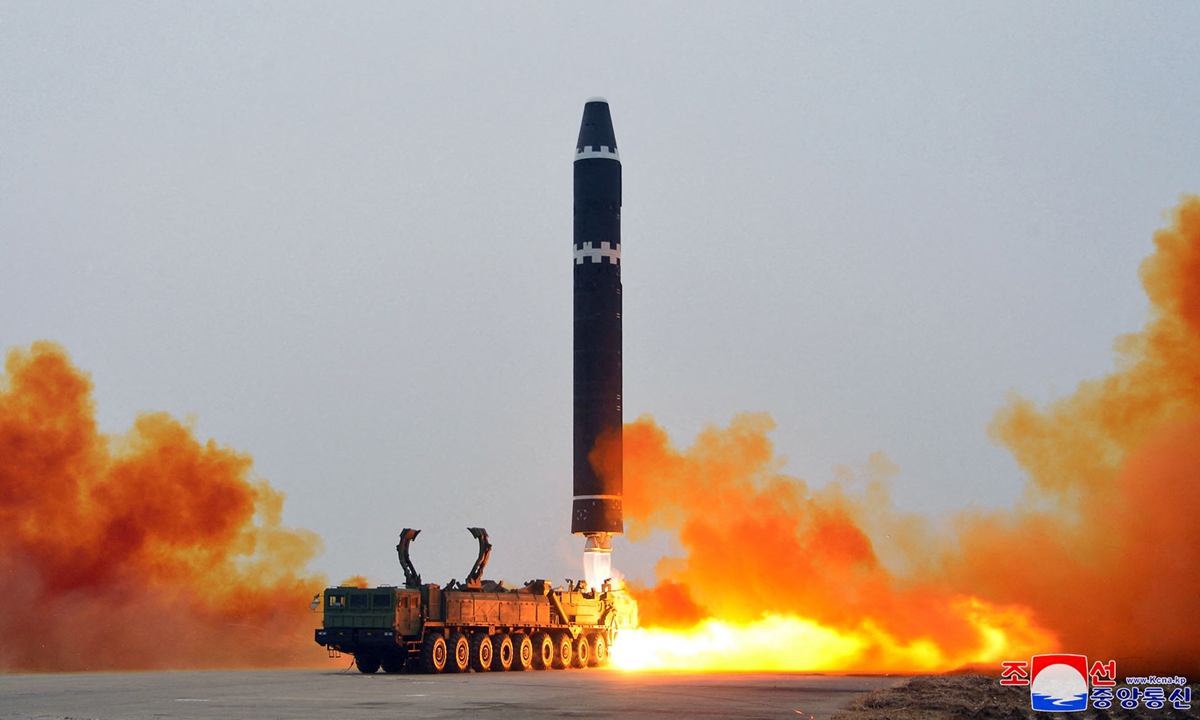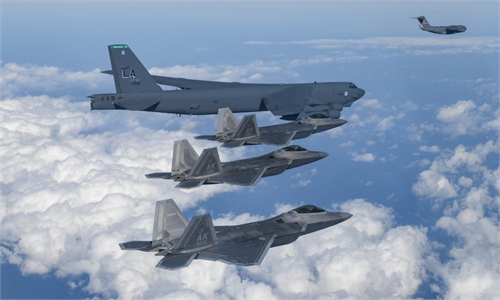NK launches intercontinental ballistic missile after US, SK announce military drills; US blamed for unshakable responsibility for tensions

The Hwasongpho-15, an intercontinental ballistic missile, fired on a lofted angle, was carried out at Pyongyang International Airport and accurately hit a pre-set area in the eastern open waters on February 18, 2023, the official Korean Central News Agency reported.
North Korea has reportedly fired an intercontinental ballistic missile (ICBM) on Saturday, which Chinese experts believe is a response to joint military exercises planned by the US and South Korea.
The Hwasongpho-15, fired on a lofted angle, was carried out at Pyongyang International Airport and accurately hit a pre-set area in the eastern open waters on Saturday afternoon. The launch was conducted under an emergency firepower combat standby order given at dawn on Saturday and a written order by Kim Jong-un, chairman of the Central Military Commission of the Workers' Party of Korea, the official Korean Central News Agency reported Sunday.
The news agency reported that the move was designed to verify the weapons system's reliability and showcase the combat preparedness of the country's nuclear force.
It came right after South Korea announced on Friday joint tabletop exercises to be held next week aimed at improving operations of US nuclear assets, and regular springtime drills next month.
Kim Yo-jong, vice department director of the Central Committee of the Workers' Party of Korea, issued a statement on Sunday accusing the US and South Korea of "openly showing their dangerous greed and attempt to gain the military upper hand and predominant position in the Korean Peninsula."
She said the US and South Korea are "destroying the stability of the region," and she vowed that the DPRK "will watch every movement of the enemy and take corresponding and very powerful and overwhelming counteraction."
Some Chinese experts believe that the latest launch is another round of negative interactions between North Korea and the US-South Korea alliance, which escalated the tensions on the peninsula and in the region.
This is a dead end. North Korea and the US-South Korea alliance have become trapped in an arms race-driven security dilemma, which is getting deeper and deeper, Yang Xiyu, a senior research fellow at the China Institute of International Studies, told the Global Times.
"In the short term, the tension on the Korean Peninsula will not ease. In fact, it's likely to escalate, and chances for dialogue between the two sides are slim," Yang noted.
In particular, if large-scale and highly deterrent military exercises are conducted in the peninsula, North Korea will take corresponding strong countermeasures, Lü Chao, an expert on the Korean Peninsula issue at the Liaoning Academy of Social Sciences, told the Global Times on Sunday.
Despite the stance of the US and South Korea, Pyongyang's statement saying that it will not target Seoul with ICBMs reflects that North Korea is showing some restraint in provoking regional tensions, the expert believed.
Still, tensions on the Korean Peninsula remain at an all-time high, with a cessation of contact and dialogue between the different sides replaced by continuous military exercises and weapons tests, Lü noted.
The US government bears unshakable responsibility for the tensions in the region, especially after the Biden administration took office and negated former president Donald Trump's strategic engagement toward North Korea, Lü said. He noted that it reflects that the US Indo-Pacific Strategy is actually intended to create tensions on the peninsula and tie Japan and South Korea into the alliance, so as to further increase the US military presence in the region.
One day after North Korea's intercontinental ballistic missile test, the US held aerial drills with South Korea and Japan in a show of force, according to the Bloomberg, saying it is a tit-for-tat military move added to the simmering tensions in the region.
To ease tensions in the region, the foremost prerequisite is that the US must correct its current strategy of dealing with North Korea. This is the basis and bottom-line principle for relevant parties to sit down for further negotiations, experts warned.

